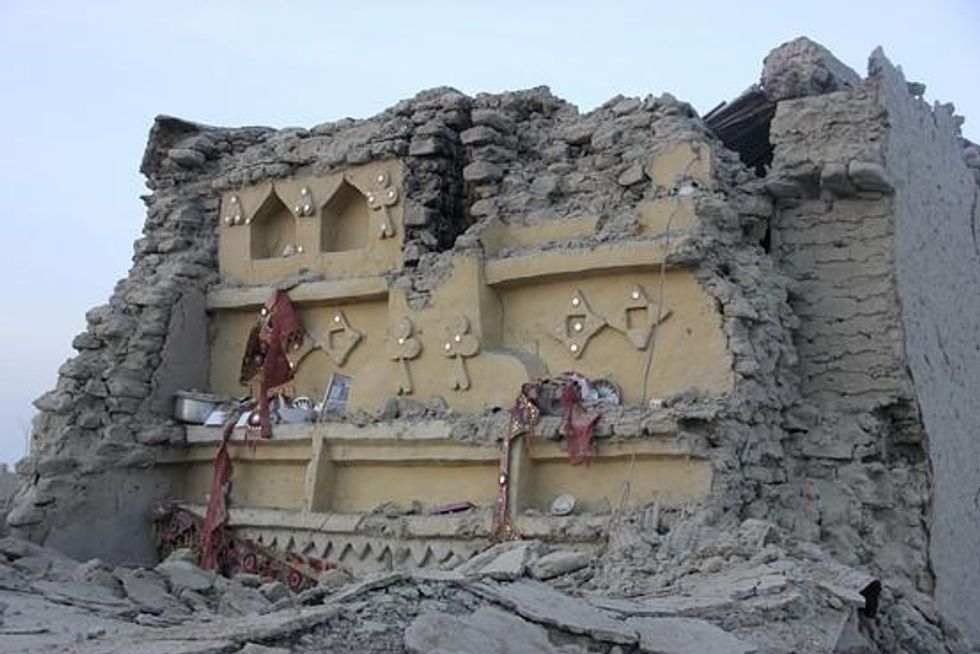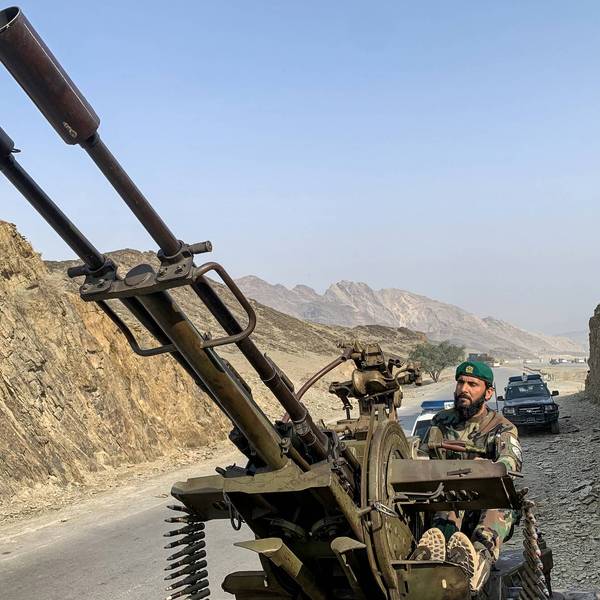Humanitarian Nightmare Spreads in Wake of Pakistan Earthquake
As toll of dead and injured rises, survivors face shortage of water, shelter, medical supplies

The 7.7 magnitude earthquake that struck the impoverished Baluchistan province Tuesday has destroyed an estimated 21,000 houses, trapping an unknown number of people and forcing thousands of survivors to sleep without the protection of shelter.
In addition, survivors face soaring temperatures and a shortage of drinking water in a region in the grips of a drought.
In the Balochistan district that comprises 40 percent of Pakistan's land mass, with a population of 9 million people, the disaster is exacerbated by high levels of poverty and an insufficient medical infrastructure. Doctors report shortages of medical equipment, medicines, and ambulances amid the flood of patients needing help.
In the town of Arawan, approximately 100 people protested at the district office, demanding more help for survivors. "The people who survived the earthquake are dying now because they have no food or water," said protester Abdul Latif, the Washington Post reports.
The government has deployed more than 1,000 troops to the region. The military reported Thursday that a helicopter transporting the National Disaster Management Authority to the site of the disaster was fired at by two rockets, with the military claiming militants fighting for a separate state in Balochistan were responsible. None were reported injured.
The massive earthquake was so strong it appears to have created a new island off the coast of Pakistan.
_____________________
An Urgent Message From Our Co-Founder
Dear Common Dreams reader, The U.S. is on a fast track to authoritarianism like nothing I've ever seen. Meanwhile, corporate news outlets are utterly capitulating to Trump, twisting their coverage to avoid drawing his ire while lining up to stuff cash in his pockets. That's why I believe that Common Dreams is doing the best and most consequential reporting that we've ever done. Our small but mighty team is a progressive reporting powerhouse, covering the news every day that the corporate media never will. Our mission has always been simple: To inform. To inspire. And to ignite change for the common good. Now here's the key piece that I want all our readers to understand: None of this would be possible without your financial support. That's not just some fundraising cliche. It's the absolute and literal truth. We don't accept corporate advertising and never will. We don't have a paywall because we don't think people should be blocked from critical news based on their ability to pay. Everything we do is funded by the donations of readers like you. Will you donate now to help power the nonprofit, independent reporting of Common Dreams? Thank you for being a vital member of our community. Together, we can keep independent journalism alive when it’s needed most. - Craig Brown, Co-founder |

The 7.7 magnitude earthquake that struck the impoverished Baluchistan province Tuesday has destroyed an estimated 21,000 houses, trapping an unknown number of people and forcing thousands of survivors to sleep without the protection of shelter.
In addition, survivors face soaring temperatures and a shortage of drinking water in a region in the grips of a drought.
In the Balochistan district that comprises 40 percent of Pakistan's land mass, with a population of 9 million people, the disaster is exacerbated by high levels of poverty and an insufficient medical infrastructure. Doctors report shortages of medical equipment, medicines, and ambulances amid the flood of patients needing help.
In the town of Arawan, approximately 100 people protested at the district office, demanding more help for survivors. "The people who survived the earthquake are dying now because they have no food or water," said protester Abdul Latif, the Washington Post reports.
The government has deployed more than 1,000 troops to the region. The military reported Thursday that a helicopter transporting the National Disaster Management Authority to the site of the disaster was fired at by two rockets, with the military claiming militants fighting for a separate state in Balochistan were responsible. None were reported injured.
The massive earthquake was so strong it appears to have created a new island off the coast of Pakistan.
_____________________

The 7.7 magnitude earthquake that struck the impoverished Baluchistan province Tuesday has destroyed an estimated 21,000 houses, trapping an unknown number of people and forcing thousands of survivors to sleep without the protection of shelter.
In addition, survivors face soaring temperatures and a shortage of drinking water in a region in the grips of a drought.
In the Balochistan district that comprises 40 percent of Pakistan's land mass, with a population of 9 million people, the disaster is exacerbated by high levels of poverty and an insufficient medical infrastructure. Doctors report shortages of medical equipment, medicines, and ambulances amid the flood of patients needing help.
In the town of Arawan, approximately 100 people protested at the district office, demanding more help for survivors. "The people who survived the earthquake are dying now because they have no food or water," said protester Abdul Latif, the Washington Post reports.
The government has deployed more than 1,000 troops to the region. The military reported Thursday that a helicopter transporting the National Disaster Management Authority to the site of the disaster was fired at by two rockets, with the military claiming militants fighting for a separate state in Balochistan were responsible. None were reported injured.
The massive earthquake was so strong it appears to have created a new island off the coast of Pakistan.
_____________________

